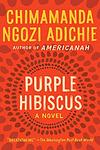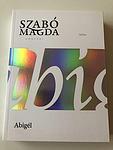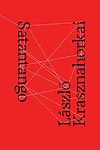The Greatest Nigerian, Hungarian "Fiction" Books Since 1970
Click to learn how this list is calculated.
This list represents a comprehensive and trusted collection of the greatest books. Developed through a specialized algorithm, it brings together 300 'best of' book lists to form a definitive guide to the world's most acclaimed books. For those interested in how these books are chosen, additional details can be found on the rankings page.
Genres
Countries
Date Range
Reading Statistics
Click the button below to see how many of these books you've read!
Download
If you're interested in downloading this list as a CSV file for use in a spreadsheet application, you can easily do so by clicking the button below. Please note that to ensure a manageable file size and faster download, the CSV will include details for only the first 500 books.
Download-
1. Half of a Yellow Sun by Chimamanda Ngozi Adichie
The novel is set in Nigeria during the Biafran War, exploring the impact of the conflict on the lives of its characters. The story is told from the perspective of three characters: a young houseboy, a radical university professor, and the professor's wealthy lover. The narrative delves into themes of love, race, and war, offering a vivid depiction of the horrors of conflict and the resilience of the human spirit.
-
2. Fateless by Imre Kertész
"Fateless" is a harrowing account of a Hungarian Jewish boy's experiences in Nazi concentration camps during World War II. The protagonist is sent to Auschwitz, then Buchenwald, and finally to a factory in Zeitz, enduring brutal conditions and witnessing unimaginable horrors. Despite his experiences, he maintains a detached, almost indifferent perspective, focusing on the mundane aspects of life in the camps, which further highlights the absurdity and horror of the situation. The novel explores themes of identity, survival, and the arbitrary nature of fate.
-
3. The Famished Road by Ben Okri
The novel centers around the life of an abiku, a spirit child, who resides in the bustling city of Lagos. Despite numerous attempts to return to the spiritual world, the boy is tethered to the physical realm through the love of his mother. As he navigates through the political unrest and poverty of post-colonial Nigeria, he experiences a series of surreal and mystical encounters, all while wrestling with the pull of the spirit world. The narrative is a blend of reality and the supernatural, providing a unique perspective on the struggles and complexities of human life.
-
4. Americanah by Chimamanda Ngozi Adichie
The novel follows a young Nigerian woman who emigrates to the United States for a university education. While there, she experiences racism and begins blogging about her experiences as an African woman in America. Meanwhile, her high school sweetheart faces his own struggles in England and Nigeria. The story is a powerful exploration of race, immigration, and the complex nature of identity, love, and belonging.
-
5. Second-class Citizen by Buchi Emecheta
"Second-Class Citizen" is a poignant narrative about a young Nigerian woman, Adah, who dreams of getting an education and moving to the United Kingdom. Despite cultural and societal obstacles, Adah manages to achieve her dream but is met with more hardship as she faces racial discrimination, an abusive marriage, and the struggle of raising five children in a foreign land. Through her resilience, she continues to strive for a better life, depicting the struggles of immigrants and the strength of women.
-
6. The Notebook: The Proof ; The Third Lie : Three Novels by Agota Kristof
"The Notebook: The Proof ; The Third Lie : Three Novels" is a trilogy of novels that follow the lives of twin brothers, living through the harsh realities of war, separation, and betrayal. The first novel, "The Notebook," tells the story of their survival as children in a rural town at the end of World War II. The second book, "The Proof," continues their story into adulthood, exploring the effects of their traumatic childhood. The final book, "The Third Lie," delves into the complexities of their relationship and the secrets they kept from one another. The trilogy is a poignant exploration of identity, love, and the enduring bond of brotherhood.
-
7. The Joys Of Motherhood by Buchi Emecheta
"The Joys of Motherhood" is a poignant and powerful novel that explores the life of Nnu Ego, a Nigerian woman who struggles to find fulfillment and happiness in the traditional role of motherhood. Set against the backdrop of colonial Nigeria, the story delves into themes of gender inequality, cultural expectations, and the sacrifices mothers make for their children. Through Nnu Ego's experiences, the author offers a thought-provoking examination of the complexities and contradictions of motherhood in a rapidly changing society.
-
8. Celestial Harmonies by Peter Esterhazy
"Celestial Harmonies" is a historical novel that tells the story of the aristocratic Esterházy family, tracing their lineage from the late Middle Ages to the present day. The narrative is divided into two parts, with the first part featuring a series of vignettes about the family's ancestors, while the second part focuses on the experiences of the narrator's father under the Communist regime in Hungary. The novel is characterized by its intricate structure, complex themes, and lush, poetic language, offering a rich exploration of Hungarian history, family dynamics, and the human condition.
-
9. The Door by Szabó, Magda
"The Door" by Magda Szabo is a novel about the relationship between two women, one of whom is a writer and the other is her housekeeper. The story explores themes of class, power, and the complexities of human relationships. As the two women become increasingly intertwined, their relationship becomes more and more complicated, leading to unexpected consequences for both of them. The novel is a powerful exploration of the human condition, and a poignant reminder of the importance of understanding and empathy in our interactions with others.
-
10. Epepe by Ferenc Karinthy
The book revolves around a linguist who finds himself inexplicably trapped in a nightmarish city where he cannot understand the language or communicate with the inhabitants. Despite his expertise in languages, the protagonist's skills are rendered useless in this alien environment, leading to a series of Kafkaesque encounters as he desperately tries to make sense of his surroundings and find a way back home. His isolation is compounded by the city's indifferent bureaucracy and the strange, often absurd, customs of its citizens, turning his ordeal into an existential struggle for identity and understanding in the face of an incomprehensible world.
-
11. Purple Hibiscus by Chimamanda Ngozi Adichie
"Purple Hibiscus" follows the story of a 15-year-old Nigerian girl, Kambili, and her older brother Jaja, who live a privileged life in Enugu. However, their father is a religious fanatic and a domestic tyrant. The siblings are sent to their Aunty Ifeoma's home, a university professor, who provides them a taste of freedom and shows them a different way of life outside their father's oppressive rule. The novel explores themes of colonialism, religious fanaticism, and the post-colonial political situation in Nigeria.
-
12. Idu by Flora Nwapa
This novel explores the life of Idu, a devoted wife whose existence becomes deeply intertwined with that of her husband, Amadi, who is the love of her life. Set against the backdrop of traditional Igbo society in Nigeria, the story delves into themes of love, loss, and the societal expectations placed upon women. When tragedy strikes and Idu is faced with Amadi's untimely death, her world is shattered, leading her to challenge the conventions and expectations of widowhood. Her profound connection to her husband transcends the physical realm, showcasing the depth of her love and commitment. Through Idu's journey, the narrative presents a poignant exploration of the roles of women, the significance of tradition, and the power of love to transcend the boundaries of life and death.
-
13. Children Of Blood And Bone by Tomi Adeyemi
In a world where magic has been suppressed and the maji people have been oppressed, Zélie, a young maji girl, embarks on a dangerous quest to restore magic and bring justice to her people. Alongside her brother and a rogue princess, Zélie must confront her own powers and face formidable enemies, navigating a treacherous landscape of betrayal and sacrifice. As they race against time, Zélie discovers that she may hold the key to not only saving her people, but also to changing the destiny of their entire nation.
-
14. An Image Of Africa by Chinua Achebe
"An Image of Africa" is a critical essay that explores the portrayal of Africa and Africans in Western literature, focusing particularly on Joseph Conrad's "Heart of Darkness." The author argues that Conrad, despite being celebrated as a paragon of modernist literature, presents Africa as an antithesis to Europe and civilization, and Africans as culturally and humanly inferior. This work challenges the implicit racism in treating Africa as merely a backdrop for the breakdown of Europeans, urging a reevaluation of how African people and their cultures are depicted in literature and beyond.
-
15. The Melancholy of Resistance by László Krasznahorkai
"The Melancholy of Resistance" is a surreal and philosophical novel set in a small Hungarian town that becomes isolated by a massive snowstorm. The arrival of a mysterious circus, featuring a stuffed whale and a silent, enigmatic leader, brings with it a wave of change and unrest. The narrative explores themes of chaos, resistance, and the struggle for power through the perspectives of various townsfolk, including a reclusive music theorist and a former political dissident. The novel is known for its complex, long-winded sentences and its bleak yet profound examination of human nature and society.
-
16. The Bride Price by Buchi Emecheta
"The Bride Price" is a novel that explores the life of a young Nigerian girl who, despite her father's disapproval, dreams of furthering her education. After her father's death, she is forced into an arranged marriage due to cultural traditions, but she defies the system and elopes with her lover. However, the consequences of unpaid bride price haunt her, leading to a tragic ending. The book highlights the clash between traditional African values and modern aspirations, the struggles of women in patriarchal societies, and the impact of colonialism on African cultures.
-
17. Death And The King's Horsemen by Wole Soyinka
"Death And The King's Horsemen" is a powerful play set in Nigeria during the colonial era. It explores the clash between traditional African beliefs and the influence of Western culture. The story follows the tragic consequences that unfold when a British colonial officer tries to prevent the ritual suicide of the king's horseman, who is duty-bound to accompany his deceased king to the afterlife. The play delves into themes of cultural identity, the clash of civilizations, and the consequences of interfering with sacred traditions.
-
18. Abigél by Szabó, Magda
Set against the backdrop of World War II in Hungary, the novel follows a young girl sent to a strict boarding school in the countryside by her father, a high-ranking general who fears for her safety amidst the war. Struggling to fit in and feeling abandoned, she eventually discovers the school harbors deep secrets, including the mysterious "Abigél," a statue that seems to be at the center of a clandestine operation protecting those persecuted by the war. As the protagonist navigates the complexities of adolescence, authority, and the harsh realities of her time, she learns valuable lessons about trust, loyalty, and the power of community in the face of adversity.
-
19. Indul A Bakterház by Sándor Rideg
"Indul A Bakterház" is a Hungarian novel that follows the life of a young boy growing up in a rural village during the interwar period. The narrative centers around the boy's experiences in a strict, yet comical, educational system and his interactions with a cast of eccentric characters, including his family members and schoolmates. Through a series of humorous and poignant episodes, the novel paints a vivid picture of village life, exploring themes of adolescence, tradition, and the universal journey of growing up amidst the challenges of poverty and societal change.
-
20. Give Me Back My Mountains by Albert Wass
"Give Me Back My Mountains" is a poignant historical novel that delves into the struggles and resilience of a Transylvanian noble family during the tumultuous period of World War II and the subsequent communist takeover. The narrative explores themes of loss, identity, and the unyielding human spirit, as the family confronts the confiscation of their ancestral lands and the erosion of their cultural heritage. Through vivid characters and rich descriptions, the book paints a picture of a bygone era, highlighting the personal and collective challenges faced by those who lived through the seismic political shifts of the 20th century in Eastern Europe.
-
21. Satantango by László Krasznahorkai
"Satantango" is a bleak and atmospheric novel set in a small Hungarian village, where a group of desperate and disillusioned characters become entangled in a web of deception, corruption, and despair. As they navigate through the decaying landscape and their own inner demons, the novel explores themes of power, greed, and the human capacity for both cruelty and redemption. With its rich prose and intricate storytelling, "Satantango" offers a haunting and thought-provoking reflection on the human condition.
-
22. Helping Verbs Of The Heart by Peter Esterhazy
"Helping Verbs Of The Heart" by Peter Esterhazy is a thought-provoking and introspective novel that delves into the complexities of love and relationships. Through a series of interconnected stories and characters, the book explores the various ways in which love can shape and define our lives. With lyrical prose and deep emotional insight, Esterhazy examines the power of love to both heal and wound, and ultimately leaves readers pondering the profound impact that love can have on the human heart.
-
23. Thistle by István Fekete
"Thistle" is a heartwarming tale of a young golden eagle navigating the trials and tribulations of the natural world. Set against the backdrop of the majestic Hungarian landscape, the story follows the protagonist from its time as an eaglet in the nest through its journey to adulthood. The narrative delves into the challenges faced by the eagle, including the search for food, the threat of predators, and the struggle for survival in the changing seasons. Along the way, the eagle encounters a host of other animals, each with their own stories, contributing to a rich tapestry of wildlife and the intricate balance of nature. The book is a celebration of resilience, independence, and the beauty of the wild, offering readers a glimpse into the life of one of nature's most impressive birds of prey.
-
24. The Stillborn by Zaynab Alkali
"The Stillborn" is a poignant narrative that explores the lives of women in a traditional African society, focusing on their struggles, resilience, and the quest for personal identity. The story delves into the complexities of polygamy, cultural expectations, and the impact of modernity on rural communities. Through the experiences of its female protagonists, the novel highlights the challenges faced by women in their pursuit of education, autonomy, and fulfillment in a male-dominated environment, ultimately offering a critique of the societal norms that stifle their growth and the transformative power of self-awareness and communal support.
-
25. Régimódi Történet by Szabó, Magda
"Régimódi Történet" is a poignant narrative set in early 20th-century Hungary, focusing on the life of a young girl from a noble family. As she grows up, she witnesses the decline of her family's fortunes and the changing social order following World War I. The novel explores themes of love, loss, and the passage of time, as well as the impact of historical events on individual lives. Through the protagonist's eyes, the reader experiences the challenges of adapting to a new era while clinging to the values and traditions of the past. The story is a rich tapestry of personal and historical transformation, illustrating the resilience of the human spirit in the face of adversity.
Reading Statistics
Click the button below to see how many of these books you've read!
Download
If you're interested in downloading this list as a CSV file for use in a spreadsheet application, you can easily do so by clicking the button below. Please note that to ensure a manageable file size and faster download, the CSV will include details for only the first 500 books.
Download


















